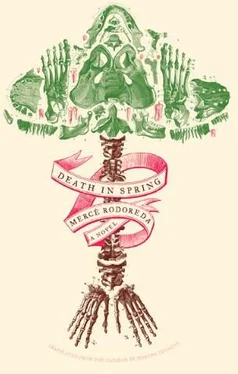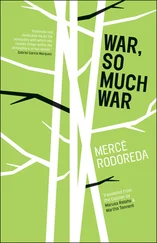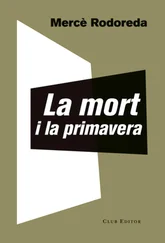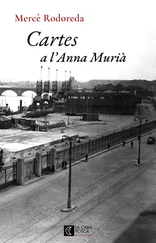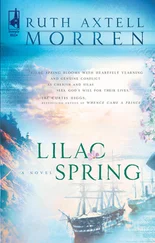But he had to die like everyone else. They made him die in the center of the Plaça. They wanted to watch him. When Senyor’s eyes began to protrude, an old man from the slaughterhouse said: he wanted to see the village carried away by the river, and the village sees him carried away by death. And I didn’t know where that girl was.
Everything was solitary and quiet as I walked back down the path. Groups of men were strolling through the streets. I could not rid myself of the fever that had passed to my hand, nor free my eyes of the image of Senyor’s vacant eyes peering at me above his mottled hand as I described my father’s last death. All of this merged with the images of the man who enjoyed watching people die and the woman shouting as she was led away. I approached one of the groups, where a man was explaining that early that morning — when the sun was scaling the stone arch, heading for the bend in the river — he had ventured close to the old man’s cave and found the man with the cudgel standing in the center of the clearing, hands in the air, crying out to the stones and to all that could hear him — everywhere his voice could reach — that he was a dead man. I left the group and drew near another, where a man said that someone had stolen the cudgel from the old man of the cave. The man announced that if he discovered who had committed the deed, he’d drag his face through the dust, slash open his back with the old man’s cudgel, and sow the ground with his blood. Another man said in a troubled voice that when he was young he’d fought against the patient old man, and after the contest the way he perceived life had changed. In front of the blacksmith’s house, a large number of men were discussing whether it was a good thing to have troubled the old man, who’d had a difficult life. To steal his cudgel was to steal his hands. One mentioned that he could remember how the old man had won the cave when he was young by fighting against two cudgel-swinging men. He’d defeated the two of them without moving, stopping the blows of one and the other as they swung and tried to outwit him. Finally he’d delivered the death blow to both, and took possession of the cave, leaving the men at his feet, slain by killings as clean as handfuls of water. As the man uttered these last words beneath the heavy wisteria-laden night, I saw the hand without ever seeing it. The blacksmith’s voice could be heard above the others’, telling them there was no need to be so anxious: his son had just reported that the old man had recovered his cudgel. Go home to your houses, don’t think of this any more. A youngish man, with black eyes and sunken cheeks, approached the blacksmith, placing his hand on the smithy’s shoulder. The blacksmith turned his head, glancing at the hand on his shoulder, and looked into the man’s eyes. If anyone torments the old man of the cave, announced the young man, they’ll have to reckon with me. The day we battled, I sliced open the man of the cave’s chest, and with blood gushing out of him, the only thing the old man did was stop my blows. When I fell to the ground, as everyone did — the man of the black eyes exclaimed — instead of wounding me, he left me with light, and patience pervaded all my being. He removed his hand from the blacksmith’s shoulder and continued speaking: if anything bad should happen to the old man of the cave, I give my word that I’ll kill the prisoner. He began to shout: that bag of bones and rancor, evil soul, worse than any of us. Another man, similar to him — black eyes and flattened hair — approached him, shaking his head from side to side, as if his words were directed at everyone, and he announced that he’d talked to the prisoner once about the man of the cave. The prisoner said if the men who ventured out to fight were unmanly after their mothers had mangled their ears, they were even less so after combat. It’s hard to believe, the prisoner had told him, that no one recognizes the man of the cave’s pride. He leaves the combatants half-dead and returns to his cave to laugh. The blacksmith told him to be quiet; he wanted to know if the prisoner had said this while he was still locked in the cage or when he’d ceased to be a person. The man couldn’t respond because the man with the sunken cheeks struck him on the face with his fist, knocking him flat on the street. People cried out for the prisoner to be put back into the cage. The blacksmith raised his hand to calm the crowd, again telling everyone to go home. In the end nothing bad had occurred, the old man again had his cudgel, according to what his son had told him, and while everyone was worrying about the old man, he was sleeping like a rock. At that very moment a barely audible neighing sprang from the prisoner, and from out of the darkness a desperate neighing issued from one of the village streets. No one knew who had neighed.
When everyone had left, the blacksmith had me enter his house and by the forge asked me what Senyor had said. When I told him, he replied that he had imagined as much. While I was explaining everything Senyor had told me, he slowly ran a finger through the ashes, forming a furrow. Without cement! Don’t they understand, like your father, that it’s for their own good? To have a calm life beyond life, they must be complete, as they were before. Can’t they see that? He moved away from the forge and picked up an iron bar that I would never have been able to lift, and, full of rage, began striking the anvil madly, shouting louder and louder: don’t they understand? Don’t they understand?
A sense of unease swept through the village. I could feel it. The unease the blacksmith’s son felt when too much desire troubled the inhabitants, weighing on his chest like a storm brewing behind the mountains. At night, the prisoner would tell me his life was drawing to an end; it was almost over. He had had his fill. The water, the ivy, the wash women who think of one thing only, laughing at me because they believe that I too think only about this thing. All the women waiting for night to fall, and this thing far away, carried off not by water but by my blood that has changed and changed, growing old and thick. He asked me if the blacksmith’s son had hidden the old man’s cudgel. I told him that when the cudgel was hidden, groups of men had gathered in the village to talk about it. The prisoner said they only wanted to wag their tongues. Years ago the villagers should have mistreated the man with the cudgel; he was useless. The only thing he did was shatter young people’s strength and eagerness; the youth should thank him for wearing them out.
Two or three weeks after my visit to Senyor, a man came down the mountain and told the blacksmith to go up right away because Senyor wanted him close by, to help him die as he wished. The blacksmith made the climb with four or five other men, plus two very robust ones who carried a stretcher. I didn’t realize until later, but I think it was at that point that evil was set loose and began to ravage the village. No one was able to stop its course. As the blacksmith moved through the village, he wore the same face as the day I told him my father had entered the tree and had most likely stopped breathing. He had seemed possessed as he rushed out to gather people. They strapped Senyor to the stretcher by his feet and wrists. It seems an argument developed on the mountain — some men didn’t want Senyor to be brought down to the village. They said he should die in his own house. But the blacksmith and the men with him convinced them, with words or with blows. As the stretcher reached one end of the Plaça, the cement man arrived from the other side. Senyor looked at them all with yellow, dull eyes, as if the film covering them had been ripped away. Everyone was in the Plaça, the village crones in a corner by the shed where the paintbrushes were stored. The prisoner and horses began to neigh; no one had ever heard such a chorus of neighing, all at the same time, that lasted so long. The blacksmith gave the word for the cement man to commence; they forced open Senyor’s mouth and began to fill it. Senyor’s eyes were bulging; his chest rose twice as he retched. The man next to me described how they had gone up the mountain to fetch him. As soon as Senyor realized what they wanted, he jumped from his deathbed with frightening youthful force and tried to escape, but the blacksmith gave him a hard blow with his fist on the back of his neck and he lost consciousness. He came to his senses as they were carrying him down the mountain; they say he began to whimper, as if instead of mother and father he had had only a mother, for he whimpered more than any woman. Several young men approached the stretcher and attempted to untie Senyor; one of them grasped the cement man by the neck and would have strangled him if another man had not quickly knocked him to the ground, kicking him in the stomach. The villagers grabbed hold of the men who wanted to untie Senyor and placed them under guard near the old women. Senyor began to cough furiously, bringing up cement; a drop of blood fell on the ground, he had dug his fingernails into his palms. His body retched again; when it calmed he was dead. The pregnant women began to scream because several pregnant women from the mountain, whose eyes were unbound, wanted to remove their bandages. Throughout it all, the old women standing near the men who wanted to untie Senyor had spat and insulted Senyor as he lay dying. All except one, who went over to him, knelt down, removed the cement from round his mouth, and closed his now undiscerning eyes with her palms, so people would not see them. So people would not see the suffering eyes, the old woman had knelt in front of him and with her rough palms had pressed his eyes half closed, while there was still time she said. Everyone prepared to go to the forest. The men had already lifted the stretcher, their arms extended, the veins in the bend of their elbows taut.
Читать дальше
